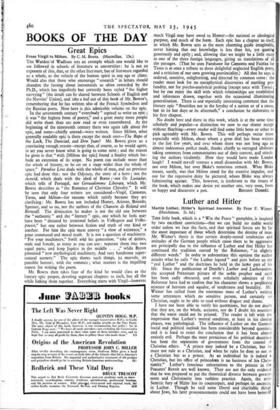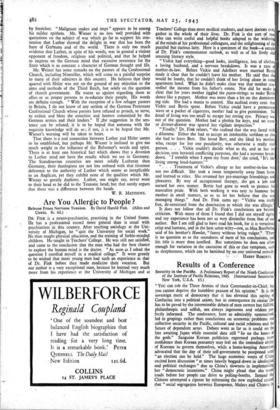Luther and Hitler
THIS little book, which is a " Win the Peace " pamphlet, is inspired by two excellent convictions—that we can build no stable world order unless we face the facts, and that spiritual forces are by far the most important of those which determine the destiny of man. Mr. Wiener's thesis is that certain deeply-seated tendencies and attitudes of the German people which cause them to be aggressive are principally due to the influence of Luther and that Hitler has continued the tradition started by the Reformer, " in slightly different words." In order to substantiate this opinion the author attacks what he calls " the Luther legend " and puts before us the " real Luther " and the doctrines he held in the latter part of his life. Since the publication of Denifle's Luther and Lutheranism, the accepted Protestant picture of the noble prophet and saint has been sadly obscured, and even scholarly admirers of the Reformer have had to confess that his character shows a perplexing mixture of heroism and squalor, of tenderness and brutality. Mr. Wiener has culled from the enormous mass of Luther's writing some utterances which no sensitive person, and certainly no Christian, ought to be able to read without disgust and shame.
I have not been able to verify his quotations, but do not doubt that they are, on the whole, accurate, nor do I doubt his assertion that the worst could not be printed. The reader is left with the impression that Luther's mental condition, at least in his closing phases, was pathological. The influence of Luther on the German social and political outlook has been considerable beyond question, and it is hard to resist the conclusion that it has been almost entirely evil. Perhaps the most pernicious of his political doctrines has been the separation of government from the control of Christian ethics. " A prince may indeed be a Christian, but be must not rule as a Christian, and when he rules he does so not as a Christian but as a prince. As an individual he is indeed a Christian, but his office of princedom is no business of his Chris- tianity." Luther's ferocious exhortations to the princes in the Peasants' Revolt are well known. They are not the only evidence that he was prepared to put the theoretical divorce between govern- ment and Christianity into ruthless practice. Again, the anti- Sernitic fury of Hitler has its counterpart, and perhaps its ancestry, in Luther. Though he said some liberal and charitable things about Jews, his later pronouncements could not have been bettered
by Streicher. " Malignant snakes and imps " appears to be among his milder epithets. Mr. Wiener is no less well provided with quotations on the subject of war which go far to support his con- tention that Luther showed the delight in war that has been the bane of Get"mans and of the world. There is only too much evidence that Luther, in spite of his words, was in general a violent opponent of freedom, religious and political, and that he helped to impress on the German mind that excessive reverence for the State which is so constant a character of German thought and life.
Mr. Weiner has some remarks on the pastors of the Confessional Church, including Niemoller, which will come as a painful surprise to many of their admirers in this country. He believes that their quarrel with Hitler was not on the ground of any objection to the aims and methods of the Third Reich, but solely on the question of church government. He warns us against regarding them as allies or as proper persons to re-educate their people. His words are definite enough. " With the exception of a few refugee pastors in Britain, I do not know of any section of the German Protestant Confessional Church whose pastors have refused to preach, to serve, to ordain and bless the atrocities and horrors committed by the German armies and their leaders." If _the suggestion in the sen- tence can be refuted, it is to be hoped that someone with the requisite knowledge will do so ; if not, it is to be hoped that Mr. Wiener's warning will be taken to heart.
That there is a real connection between Luther and Hitler seems to be established, but perhaps Mr. Wiener is inclined to give too much weight to the influence of the Reformer's words and spirit. There is at least one historical fact which shows that a devotion to Luther need not have the results which we see in Germany. The Scandinavian countries are more solidly Lutheran than Germany, their theologians are not less imbued with that tiresome deference to the authority of Luther which seems so inexplicable to an Anglican, yet they exhibit none of the qualities which Mr. Wiener so greatly deplores. Luther, one might say, never went to their head as he did to the Teutonic head; but that surely argues that there was a difference between the heads.
W. R. MATTHEWS.



























 Previous page
Previous page